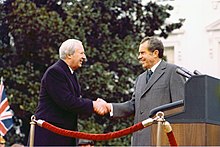The UK and the Vietnam War
This article is an orphan, as no other articles link to it. Please introduce links to this page from related articles; try the Find link tool for suggestions. (June 2024) |

The United Kingdom did not officially participate in the Vietnam War. It played an important role in the 1954 Geneva Conference, acting as co-chair along with the Soviet Union. Prior to the US Gulf of Tonkin Resolution, the United Kingdom did provide support to the South Vietnamese government in the form of advice on the use of police and paramilitary forces to combat a communist insurgency.
After the 1964 escalation of American military involvement in Vietnam, the governments of Prime Ministers Harold Wilson and Edward Heath provided diplomatic support for the USA's war effort, but refused to commit British troops to the conflict.
Early British Involvement[edit]
During the Battle of Dien Bien Phu in the early months of 1954, Conservative Prime Minister Winston Churchill refused American President Dwight Eisenhower's request to provide British military support for the French colonial forces.[1] The UK then co-chaired the subsequent 1954 Geneva Conference, which negotiated an end to French colonial rule in Indochina and established North Vietnam and South Vietnam as two distinct zones separated at the 17th parallel.[2]
Conservative Prime Minister Harold Macmillan sent a British Advisory Mission to Saigon in 1961 to advise the South Vietnamese government on the use of police and paramilitary forces against communist guerrillas.[2] This advice was based on Britain's own counterinsurgency against communist forces in Malaya.[2]
The Wilson Government (1964–70)[edit]
Labour Party leader Harold Wilson was elected to the office of Prime Minister in October 1964, only two months after the United States Congress had authorised President Lyndon Johnson to undertake military action against North Vietnam, resulting in a major escalation of the Vietnam War.[2] Wilson continued the previous Conservative government's policy of support for US military intervention in Vietnam,[2] though he was outspoken in his criticism of some aspects of the American war strategy, particularly the 1966 bombings of Haiphong and Hanoi.[2][3] The Wilson government refused to deploy British troops to Vietnam despite great external pressure from the American government and internal pressure from the British Treasury and Foreign Office.[4] In 1967, President Johnson offered to resolve Britain's economic troubles in return for Wilson's deployment of two British Brigades to Vietnam. Wilson refused.[5]
The Wilson government made efforts to mediate a peace between the US and North Vietnam in 1967. During the four-day Tet truce in February 1967, Soviet Premier Alexei Kosygin visited the UK. Wilson met with Kosygin and made efforts to extend the Tet truce, beginning with a cessations of American bombing. The peace talks failed when Johnson refused to stop bombing North Vietnam until the North's communist infiltration of South Vietnam ceased.[6] Wilson's diplomatic support of the American war effort was motivated in part by his reliance on the financial support that the USA provided to the British economy.[7] During the 1960s, American financial support was crucial in maintaining the British welfare state, arts and science policies, housing policies and student grants.[8] When Wilson was asked by a Labour party colleague why he did not condemn the Vietnam War, he responded: “we can’t kick our creditors in the balls”.[9]
The Heath Government (1970-74)[edit]

Compared to Wilson, Conservative Prime Minister Edward Heath expressed greater rhetorical support of the American war effort in Vietnam. By the time that Heath became Prime Minister in 1970, Richard Nixon was the President of the United States. Heath had been a vocal supporter of the US war policy while he was Leader of the Opposition, and he went on to support the American Christmas bombing campaign in December 1972.[10] Heath's consistent support of the Vietnam War effort led Nixon to call Heath the only solid friend in Europe that the US had.[11]
Despite the intensification of the British government's rhetorical support of the American war effort in Vietnam, Heath also refused to deploy British troops to Vietnam. While in opposition, Heath had opposed the dispatch of British troops to Vietnam and he carried this attitude into his role as Prime Minister, telling the House of Commons in July 1970 that he had no intention of sending British troops to Vietnam or becoming directly involved in the war.[12]
References[edit]
- ^ Warner, Geoffrey (1989). Britain and the Crisis over Dien Bien Phu, April 1954: The Failure of United Action. SR Books. pp. 55–77. ISBN 0842023410. Archived from the original on 27 June 2019. Retrieved 27 June 2019.
- ^ a b c d e f Vickers, Rhiannon (April 30, 2008). "Harold Wilson, the British Labour Party, and the War in Vietnam". Journal of Cold War Studies. 10 (2): 41–70. doi:10.1162/jcws.2008.10.2.41.
- ^ Wilson, Harold (1974). The Labour Government, 1964–1970: A Personal Record. Harmondsworth: Penguin Books. ISBN 978-0718109479.
- ^ Pimlott, Ben (1992). Harold Wilson. London: HarperCollins. pp. 385–389. ISBN 978-0002151894.
- ^ Sandbrook, D. (2007). White Heat: A History of Britain in the Swinging Sixties, 1964–1970. Revised ed. London: Abacus, page 382.
- ^ Pimlott 1992, p. 460-462.
- ^ Pimlott 1992, p. 384-385.
- ^ Pimlott 1992, p. 394.
- ^ Dyson, Stephen Benedict (December 31, 2007). "Alliances, Domestic Politics, and Leader Psychology: Why Did Britain Stay Out of Vietnam and Go into Iraq?". Political Psychology. 28 (6): 647–666. doi:10.1111/j.1467-9221.2007.00598.x – via CrossRef.
- ^ Jones, Matthew (January 2, 2022). "'The Blue-Eyed Boys': The Heath Government, Anglo-American Relations, and the Bombing of North Vietnam in 1972". The International History Review. 44 (1): 92–98. doi:10.1080/07075332.2021.1915360 – via CrossRef.
- ^ Jones 2022, p. 107.
- ^ Jones 2022, p. 95-98.
